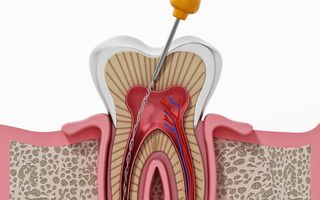Endodontics Frenchs Forest
Relieve pain and save your natural tooth with gentle, effective root canal therapy

At Blue House Dental, we may recommend root canal treatment (also known as endodontic therapy) for severely infected or damaged teeth. This issue often arises when untreated decay or damage allows bacteria to invade the tooth's central area, known as the pulp.
The pulp is a vital part of the tooth during development, containing nerves, blood vessels, and connective tissue.
What is Endodontics (root canal treatment)?
Root canal treatment is a specialised procedure that allows us to save a tooth that is badly damaged or infected, rather than removing it.
When the inner pulp of a tooth becomes inflamed or infected – often due to deep decay, trauma, or disease – a root canal is usually the most effective solution. The treatment involves carefully removing the infected tissue, cleaning and disinfecting the inside of the tooth, and then sealing it to protect against future infection.
By treating the problem at its source, root canal therapy relieves pain, restores the tooth’s natural function, and helps maintain your long-term oral health.

Causes and symptoms of a root canal infection
A root canal infection occurs when bacteria enter the tooth’s pulp through cracks, deep cavities, or damage.
Once inside, the bacteria cause inflammation and infection, which can lead to symptoms such as severe tooth pain, swelling around the affected area, and sensitivity to hot or cold foods and drinks.
In some cases, the infection may progress without noticeable symptoms, underscoring the importance of regular dental check-ups. If left untreated, the infection can spread beyond the tooth to surrounding bone and tissue, causing serious complications.
Root canal treatment removes the infected pulp, disinfects the canals, and prevents further damage, ensuring your oral health is restored.
Benefits of root canal treatment
Root canal therapy is an effective way to save teeth that would otherwise require extraction.
Once the damaged pulp is removed, your tooth can function perfectly without it. The results of root canal treatment can last for years, often a lifetime, with proper care. Molars, which handle most chewing, typically require crowns after the procedure to provide extra strength and durability.
Although rare, re-infection can occur, in which case retreatment may be an option. Early intervention is key, so if you’re experiencing persistent tooth pain, don’t delay scheduling an appointment—addressing the issue promptly leads to better outcomes.
The Root Canal Procedure
A root canal is a straightforward treatment and is usually no more uncomfortable than having a standard filling.
Before we begin, we’ll take dental x-rays to confirm the infection and plan your treatment. Local anaesthetic ensures the area is completely numb, so while you may feel some pressure, you shouldn’t feel pain. For patients who feel nervous, we also offer sedation options – learn more on our Sleep Dentistry page.
Step-by-step, here’s what you can expect:
- An opening is made through the crown of the tooth to access the pulp.
- The infected tissue is gently removed.
- The root canals are cleaned, shaped, and disinfected using specialised instruments.
- The canals are sealed with a biocompatible material (gutta-percha) to prevent bacteria from returning.
- In severe cases, antibiotics may be placed inside the tooth before it is temporarily sealed.
- Depending on the complexity of the infection, treatment may require more than one visit.
- Once complete, the tooth is restored with either a filling or a crown for long-term strength and function.
This process not only relieves pain but also helps save your natural tooth and protect your oral health.
Recovery and aftercare

Recovery from root canal treatment is generally smooth and uncomplicated. Here's what you can expect during the healing process:
- You may experience mild discomfort or sensitivity for a few days, which can be managed with over-the-counter pain relievers.
- Avoid chewing on the treated tooth until a permanent restoration, such as a crown, is in place, as temporary fillings are not as durable.
- Maintaining good oral hygiene—brushing, flossing, and attending regular dental check-ups—is essential for long-term success.
- Follow-up appointments allow your dentist to monitor healing and determine when the final restoration can be completed.
With proper care, a tooth that has undergone root canal therapy can remain functional and healthy for many years.
Frequently asked questions
Yes, absolutely. Anyone who knows the pain of a soft tissue infection or the nerve dying inside the tooth knows just how worthwhile a root canal is. Not only does this treatment rid you of what can be severe dental pain, it also prevents the infection spreading further, and helps to preserve your natural tooth and avoid further dental treatments that you would need to replace it.
A root canal treatment in Australia depends on a number of factors, such as how many canals the tooth has (one canal makes for a simpler and faster procedure than a tooth with four canals), and whether you need additional appointments or sedation.
You may also need to factor in the cost of getting a dental crown, as this is an important follow-up to most root canals and can add an additional cost.
If you need financial assistance for your treatment, we offer an exclusive interest-free payment plan called SmileFund. With SmileFund, you can undergo your dental treatment and pay it off over time.
Sometimes, your dentist may not have the additional training or knowledge they would need in order to perform a treatment. This is most often the case for complicated root canal treatments, but your dentist may also send you to an Endodontist for other procedures, such as fixing an old root canal or placing a dental implant.
Keep your natural teeth strong and healthy
Root canal therapy is a reliable solution for saving damaged teeth, eliminating pain, and preserving your natural smile. If you’re experiencing tooth pain or suspect a problem, contact us at Blue House Dental to schedule an appointment.


